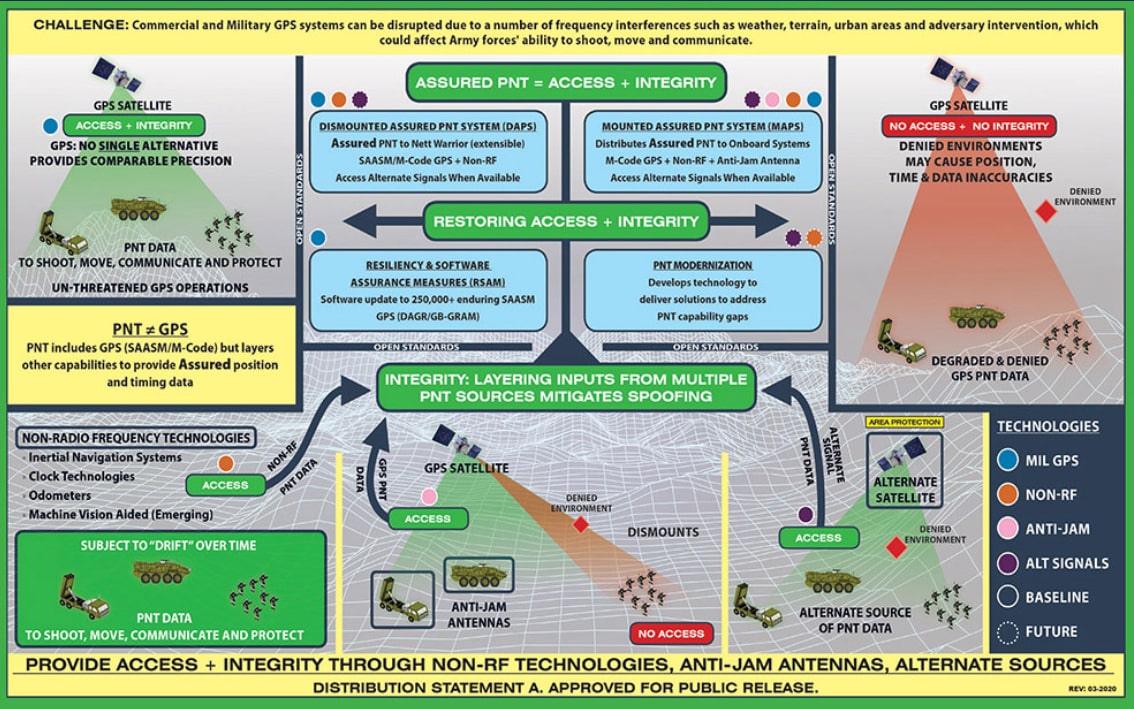


Click image to view larger. Image credit: pm-pnt.army.mil
Our nation’s security, economy, and infrastructure depend on positioning, navigation, and timing (PNT). While GPS is an integral and irreplaceable part of PNT, Assured PNT must take a layered approach due to GNSS vulnerabilities. The Army PM PNT defines Assured PNT as access plus integrity: maintaining access to PNT data in GPS degraded or denied environments and ensuring non-corrupted data. Spirent Federal can help our customers achieve Assured PNT through many modalities, some of which include jamming & spoofing assessment and mitigation, GNSS interoperability, inertial and other non-GNSS sensors, and alternative RF navigation.
Phil Bonilla, Systems Engineer at Spirent Federal, presents information on non-GNSS sensors
Executive order 13905, Strengthening National Resilience Through Responsible Use of Positioning, Navigation, and Timing Services, issued on February 18, 2020, requires the development of a national plan “for the R&D and pilot testing of additional, robust, and secure PNT services that are not dependent on global navigation satellite systems (GNSS).” To meet this requirement, a high amount of interest has developed to use multiple navigation sensors to improve integrity, performance, and autonomy. Spirent Federal is continuing to partner with government and industry to enhance its existing solutions and implement new capabilities following open source standards. One such project, the Open Ethernet Interface (OEI), will enable realistic sensor modeling via ethernet connectivity, allow for control of error inputs, maintain low latency communications, and facilitate precise timing.
Phil Bonilla, Systems Engineer at Spirent Federal, discusses alternative RF navigation
Additionally, non-GNSS sources of RF (radio frequency) are of interest in highly degraded or contested signal environments. Interest is focused on LEO (low earth orbit) constellations. These systems offer high receiver signal power (relative to GNSS) and a secure & resilient link to augment GNSS. Spirent is actively engaged with alternative RF vendors to incorporate signal simulation capability. In August 2021, Spirent Federal launched a groundbreaking, first-of-its-kind product, the Alternative RF Navigation Simulator, which allows GPS / GNSS and alternative RF signals to be tested concurrently.
Roger Hart, Engineering Director at Spirent Federal, discusses the benefits of GNSS interoperability
Memorandum on Space Policy Directive 7 (SPD 7), issued January 15, 2021, states, “Use of multiple, varied PNT services can result in better performance in terms of user accuracy, availability, and resilience … Although foreign space-based PNT services may be used to complement civil GPS service, receiver manufacturers should continue to improve security, integrity, and resilience in the face of growing cyber threats.” Spirent Federal is uniquely situated to help customers with both parts of that directive. Spirent’s multi-GNSS test systems support all GNSS constellations and augmentation systems, and our flexible solutions provide advanced tools to harden systems against GNSS vulnerabilities and develop effective countermeasures to create resilient PNT in the most challenging military environments.

Spirent Federal Launches Alternative RF Navigation Simulator
Spirent Federal’s product can simulate resilient alternative RF navigation signals on its own or concurrently with GNSS signals. Testing can be static or dynamic, with stationary, pedestrian and ground vehicle trajectories available.
Read Press Release
Transportation Requires a Fusion; Now to Test It
Inertial navigation systems (INS), like most navigation systems, have evolved through countless iterations and improvements over many years. An INS, unlike other navigation technologies, does not rely on any external signals or inputs to aid navigation. It is, therefore, extremely difficult to spoof, jam or disrupt the system, and solar flares, ground/sky visibility and climate […]
Read Blog